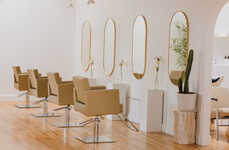
The Le'Jemalik Salon Was Created for Women Who Wear Hijabs
Mishal Omar — January 24, 2017 — Fashion
References: teenvogue & refinery29
The Le'Jemalik salon in Brooklyn, New York was created to be a comfortable space for women to come in and receive their haircuts and treatments.
The business was created by Huda Quhshi after she became fed up with the lack of accessible salons for Muslim women who wear hijabs, as most salons offer services for both women and men, and some Muslim women cannot take their hijabs off in front of men. She decided to create this women-only space in order to ensure that Muslim women felt comfortable while receiving haircuts. Although the Le'Jemalik salon is women-only, it is not only specific to Muslims, and women from all religious and ethnic backgrounds are welcome.
This salon works to create a comfortable space for a minority that tends to be underrepresented in various North American industries.
The business was created by Huda Quhshi after she became fed up with the lack of accessible salons for Muslim women who wear hijabs, as most salons offer services for both women and men, and some Muslim women cannot take their hijabs off in front of men. She decided to create this women-only space in order to ensure that Muslim women felt comfortable while receiving haircuts. Although the Le'Jemalik salon is women-only, it is not only specific to Muslims, and women from all religious and ethnic backgrounds are welcome.
This salon works to create a comfortable space for a minority that tends to be underrepresented in various North American industries.
Trend Themes
1. Women-only Spaces - Businesses can create exclusive spaces for underrepresented groups to ensure comfort and convenience.
2. Cultural Inclusivity - By catering to different cultural needs, businesses can expand their customer base and foster diversity and inclusion.
3. Niche Markets - By identifying and catering to niche markets, businesses can create successful ventures that address specific needs and provide unique experiences.
Industry Implications
1. Salon Industry - The salon industry can create women-only spaces that cater to specific cultural and religious needs, such as hijabs, to ensure inclusivity for all customers.
2. Fashion Industry - The fashion industry can create clothing lines that cater to specific religious and cultural needs, such as hijabs, to ensure inclusivity for all customers.
3. Beauty Industry - The beauty industry can create exclusive lines that cater to specific cultural and religious needs, such as halal cosmetics, to ensure inclusivity for all customers.
5.4
Score
Popularity
Activity
Freshness























